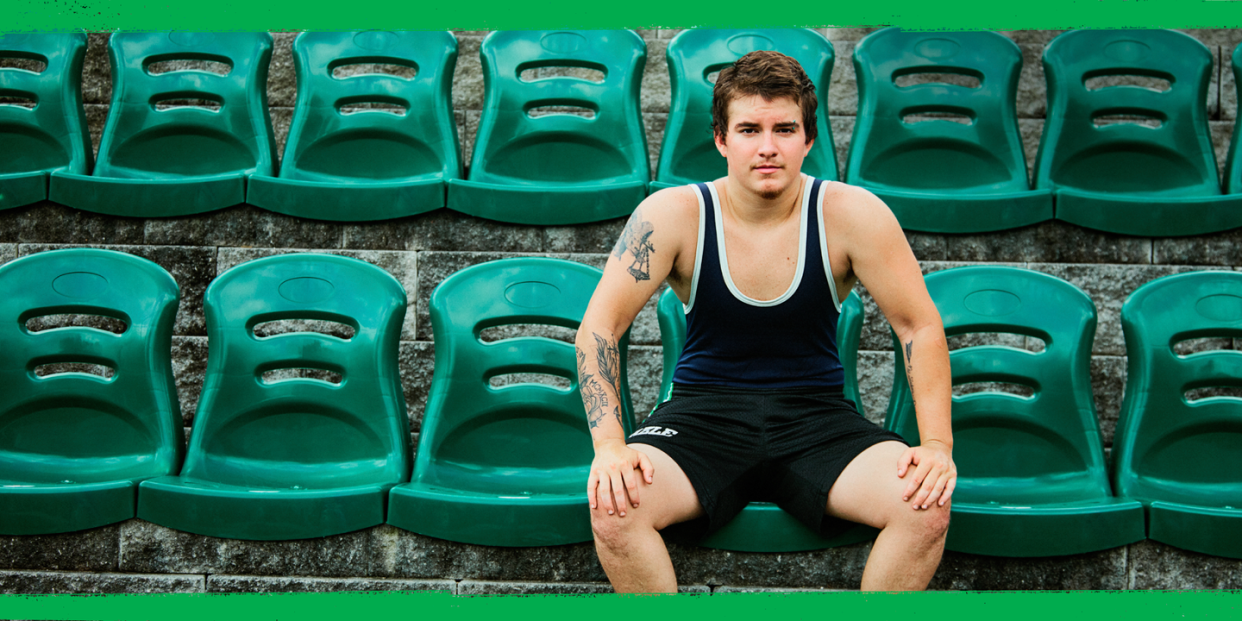Mack Beggs Is Still Grappling With Ignorance


This story is part of The 2020 Project, a Men's Health special project that explores the lives of 20 different 20-year-old men across America. To learn more about the others, go here.
YOU MIGHT KNOW Mack Beggs from the photo that rocketed around the Internet after he went undefeated to win the Texas state wrestling championship in 2018. Beggs dominated for 36 matches straight in the 110-pound weight class at Trinity High School in the Dallas and Fort Worth suburb of Euless.
In the photo, he looks unsurprised as a referee holds his jacked arm high in the air to signal victory. That’s partly because Beggs had also won the state title the year before. But the viral nature of the picture hinged on the fact that he was stuck wrestling girls. It was the girls’ state championship. Again.
Over the previous few years, Beggs had been undergoing hormone therapy as part of his gender transition. Although he was assigned female at birth, he identifies as male. But as the result of a ruling by Texas’s University Interscholastic League (UIL), Beggs was required to compete on the team aligning with the sex on his birth certificate. The controversy had been swirling since 2017, when he was a junior, complete with a lawsuit filed by a parent that attempted to bar him from competing altogether, because he had been taking standard low-dose injections of testosterone as part of his transition process.
That was around the same time that “bathroom bills” began making the rounds in legislatures in 16 mostly Southern states, including Texas—another attempt to place restrictions on people who are transgender. As online fights over gender identity and fluidity raged, Beggs found himself in the center of the vortex.
In viral clips of his winning matches, you can hear both boos and cheers from the crowd. But Beggs has always kept his game face on. “It didn’t really affect me, because I was like, ‘I don’t care. I won,’ ” he says with a shrug on a Zoom call. “You can’t make people love you at the end of the day.”

But you can try to change how things work. In 2018, Beggs publicly called out the UIL to alter its outdated regulations for other trans athletes. He now lobbies for open conversations about trans issues on social media, where he has never shied away from talking about his transition. In fact, he encourages more discussion. “I always preach to other people to be who they are,” Beggs says. “I didn’t want to hide who I was.”
Neither do many other Gen Zers. More people than ever now identify as transgender or transgender nonbinary. Research from the public-policy-minded Williams Institute at UCLA, which studies issues related to sexual orientation and gender identity, has found that, among adults, the prevalence is highest among Beggs’s peers—people between 18 and 24 years old.
Beggs’s advocacy for trans rights and mental health on platforms like Instagram is met mostly with positivity, but if there’s one thing this generation knows from having been online its whole life, it’s that there are always haters. He’s come to realize, however, that ignoring them won’t change their viewpoint. He’s reached out and said, “‘Hey, so do you want to have a conversation? Because I can explain it to you and we could go from there.’ The last few times [I reached out to someone on Instagram], they were receptive. I think they still follow me.”

Before the pandemic, Beggs traveled to the Tribeca Film Festival and the Palm Springs International Film Festival to do Q&As after screenings of Changing the Game, a film documenting the lives of transgender high school athletes, including him. This kind of unfaltering openness, he thinks, is what will allow Gen Z to continue to be more receptive to the narrative surrounding gender identity than any other generation in history. “You just gotta talk to people and get on their level,” he says.
At the same time, he’s ready to get back to wrestling, this time in a less restrictive college sports system. In late 2018, he enrolled at Life University in Marietta, Georgia, where he’s studying psychology. After redshirting for a year while he recovered from “top” surgery—another step in his gender transition—he’s prepared to return to the mat, even if it means more controversy to address directly.
“Nobody believes it when they’re younger, but life gets better,” Beggs says. “You have to manifest what you want in life. You can’t let people get you down, because at the end of the day you have yourself.”
You Might Also Like

